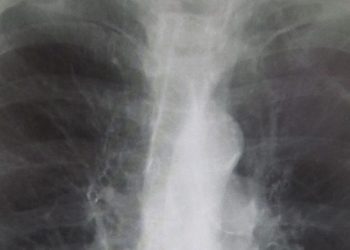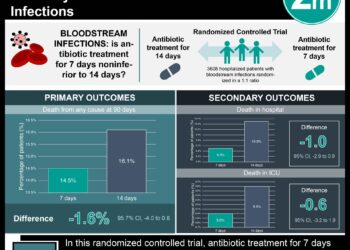#VisualAbstract: Shorter antibiotic therapy for prosthetic joint infection caused worse outcomes
1. A six-week antibiotic therapy was not shown to be non-inferior to a 12-week antibiotic therapy for patients with confirmed prosthetic joint infections.
2.The six-week therapy resulted in more unfavorable outcomes for patients compared to the 12-week therapy.
Evidence Rating Level: 1 (Excellent)
Study Rundown: Treatment of prosthetic joint infections (PJI) is challenging and often involves surgery and antimicrobial therapy. These management options are expensive and have a high long-term failure rate. Furthermore, antibiotic therapy is based on expert recommendations rather than evidence, and treatment duration can last up to six months. Recent studies have proposed the use of shorter therapy durations to reduce adverse events. As such, this study compared the efficacy and safety of a six-week antibiotic treatment (short course) and a 12-week treatment (long course) in patients with PJI. The study determined the short course was shown not to be non-inferior to the long course. Furthermore, the short course caused more patients to experience unfavorable outcomes compared to the long course. This trial was limited by an open-label study design and more patients in the short course group had undergone debridement with implant retention. Nonetheless, the results are significant, as the study determined a short antibiotic course was not appropriate for patients with PJI compared to the long antibiotic course.
Click to read the study in NEJM
In-Depth [randomized controlled trial]: This open-label, randomized control trial enrolled 410 patients from 28 centers in France between November 2011 and January 2015. Patients included in the trial were 18 years of age or older, had a confirmed prosthetic joint infection, and a microbiologically documented infection. Patients who had received an effective antibiotic therapy 21 days before screening and had a lie expectancy of fewer than two years were excluded from the study. The patients were randomized in a 1:1 ratio to receive either a 6-week antibiotic course or a 12-week antibiotic course, respectively. Antibiotic therapy was defined as the administration of antibiotics for the type of bacteria causing the infection. The primary outcome was the events of treatment failure divided into three categories: persistent infection, new infection, and probable failure. In the short course group, 35 of 193 patients (18.1%) had persistent infection whereas, in the 12-week group, 18 of 191 patients (9.4%) displayed persistent infection (risk difference [RD], 8.7 percentage points; 95% confidence interval [CI], 1.8 to 15.6). This did not meet the criterion for noninferiority. Treatment failure occurred in 13 of 190 patients (6.8%) in the short course group for new infection compared to 20 of 188 patients (10.6%) in the long course (RD, -3.8 percentage points; 95% CI, -9.7 to 2.0). Additionally, probable treatment failure occurred in 8 of 192 patients (4.2%) in the short course group compared to 7 of 190 patients (3.7%) in the long course group (RD, 0.5 percentage points; 95% CI, -3.8 to 4.8). Finally, the most common adverse events related to the operative site, musculoskeletal events, cardiovascular events, and serious reactions to antibiotics. Overall, the study results did not show non-inferiority of the six-week antibiotic treatment as compared to the 12-week antibiotic treatment for patients with confirmed prosthetic joint infection.
Image: PD
©2021 2 Minute Medicine, Inc. All rights reserved. No works may be reproduced without expressed written consent from 2 Minute Medicine, Inc. Inquire about licensing here. No article should be construed as medical advice and is not intended as such by the authors or by 2 Minute Medicine, Inc.







